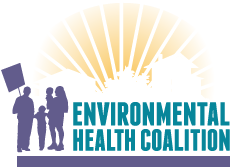NATIONAL CITY, April 14, 2016 — Today, the Port of San Diego unanimously approved the new vision for National City’s Marina District, which includes the expansion of Pepper Park – the City’s only public space with bay-front access. The approved plan will nearly double the amount of park space in the terminal and provide residents with much-needed public amenities.
Environmental Health Coalition (EHC), an organization fighting toxic pollution in low-income communities, celebrates this unprecedented collaborative plan between the City of National City, the Port of San Diego and community members. According to EHC, the 2.5-acre park expansion opens up a world of opportunity to a neighborhood that desperately needs more public recreational space.
“National City needs public space where kids can be kids and neighbors can enjoy their bayfront home,” says EHC Policy Advocate Carolina Martinez. “National City residents had a dream for this space and today, the new Marina District vision makes it a remarkable reality.”
For more than six years, EHC worked with residents of National City to finalize and present the community’s vision for the Marina District, encouraging community involvement in every step of the planning process. The Port responded by drafting several options for terminal redevelopment that included additional park space. In January of 2016, community members attended Port-led workshops to advocate for the plan that would produce contiguous, usable park space.
“In a highly polluted, dense neighborhood like National City, a simple park expansion can drastically improve the lives of so many residents,” said Martinez. “Parents can now look forward to raising their kids in a healthier and more active environment.”
For more information on Environmental Health Coalition and its efforts to reduce toxic pollution in National City, visit www.environmentalhealth.org.
###
ENVIRONMENTAL HEALTH COALITION: Founded in 1980, Environmental Health Coalition (EHC) builds grassroots campaigns to confront the unjust consequences of toxic pollution, discriminatory land use and unsustainable energy policies. Visit us online at http://www.environmentalhealth.org.

